Analysis of Health and Socio-Political Issues in Aged Care Report
VerifiedAdded on 2023/02/01
|16
|4746
|55
Report
AI Summary
This report delves into the multifaceted health and socio-political issues surrounding aged care in Australia. It begins by emphasizing the need for a shift in focus towards enhancing the mental and physical well-being of older people, advocating for changes in service organization to address the growing burden of disease within this demographic. The report provides a comprehensive overview of palliative care provision in residential aged care, defining its role in improving the quality of life for the elderly, particularly at the end-of-life stage. It highlights the importance of advanced care planning and directives, analyzing their function in helping residents make informed decisions about their future care, including discussions on ethical and legal considerations. The report then critically examines the legal issues and challenges associated with advanced care directives, such as communication difficulties, lack of uniformity in laws, and the potential for misunderstandings. Finally, it considers ethical considerations related to advanced care directives and proposes strategies to improve palliative care provision in residential aged care, including the need for appropriately skilled staff, active communication, and collaboration among healthcare teams, ultimately aiming to enhance the dignity and quality of life for the elderly.
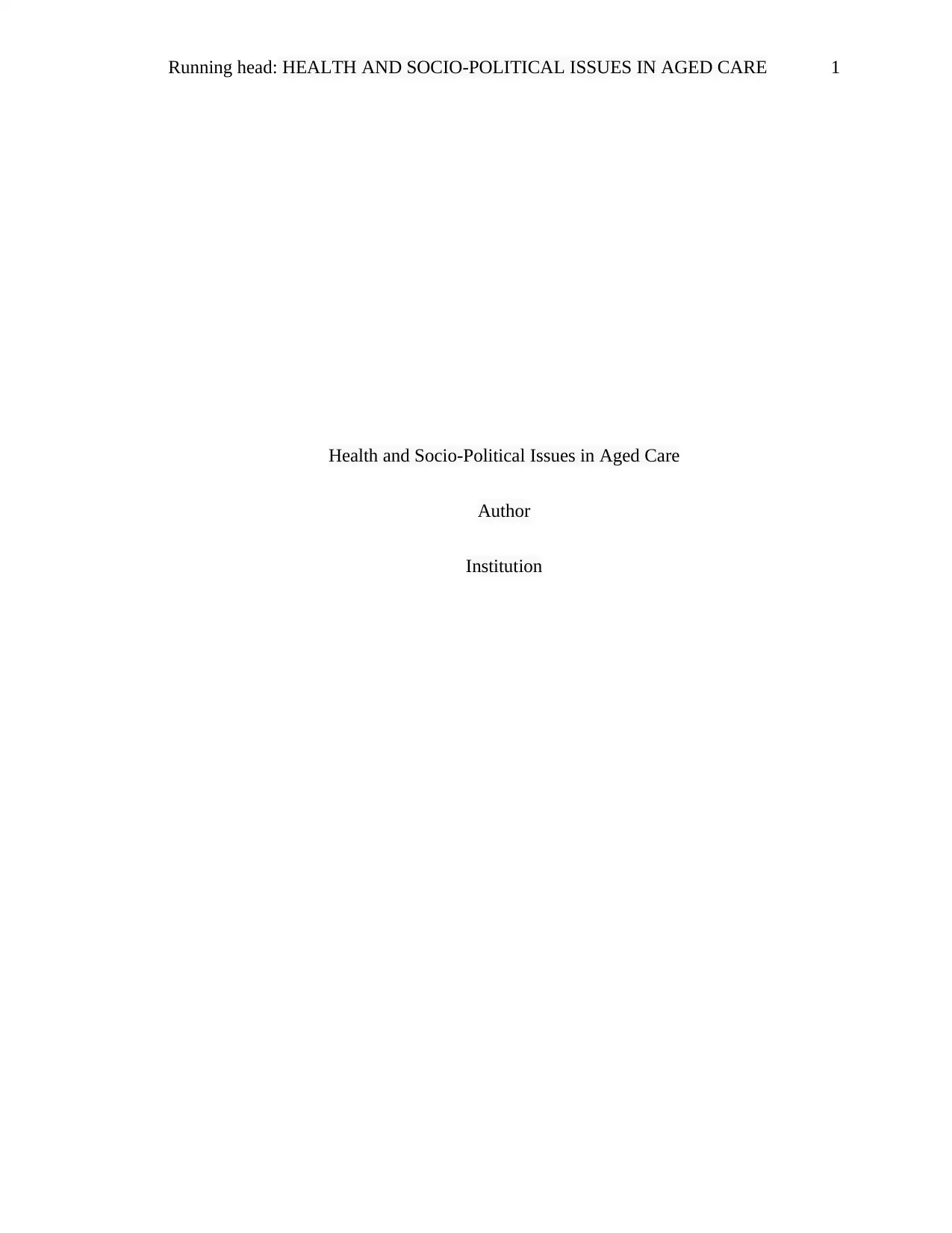
Running head: HEALTH AND SOCIO-POLITICAL ISSUES IN AGED CARE 1
Health and Socio-Political Issues in Aged Care
Author
Institution
Health and Socio-Political Issues in Aged Care
Author
Institution
Paraphrase This Document
Need a fresh take? Get an instant paraphrase of this document with our AI Paraphraser
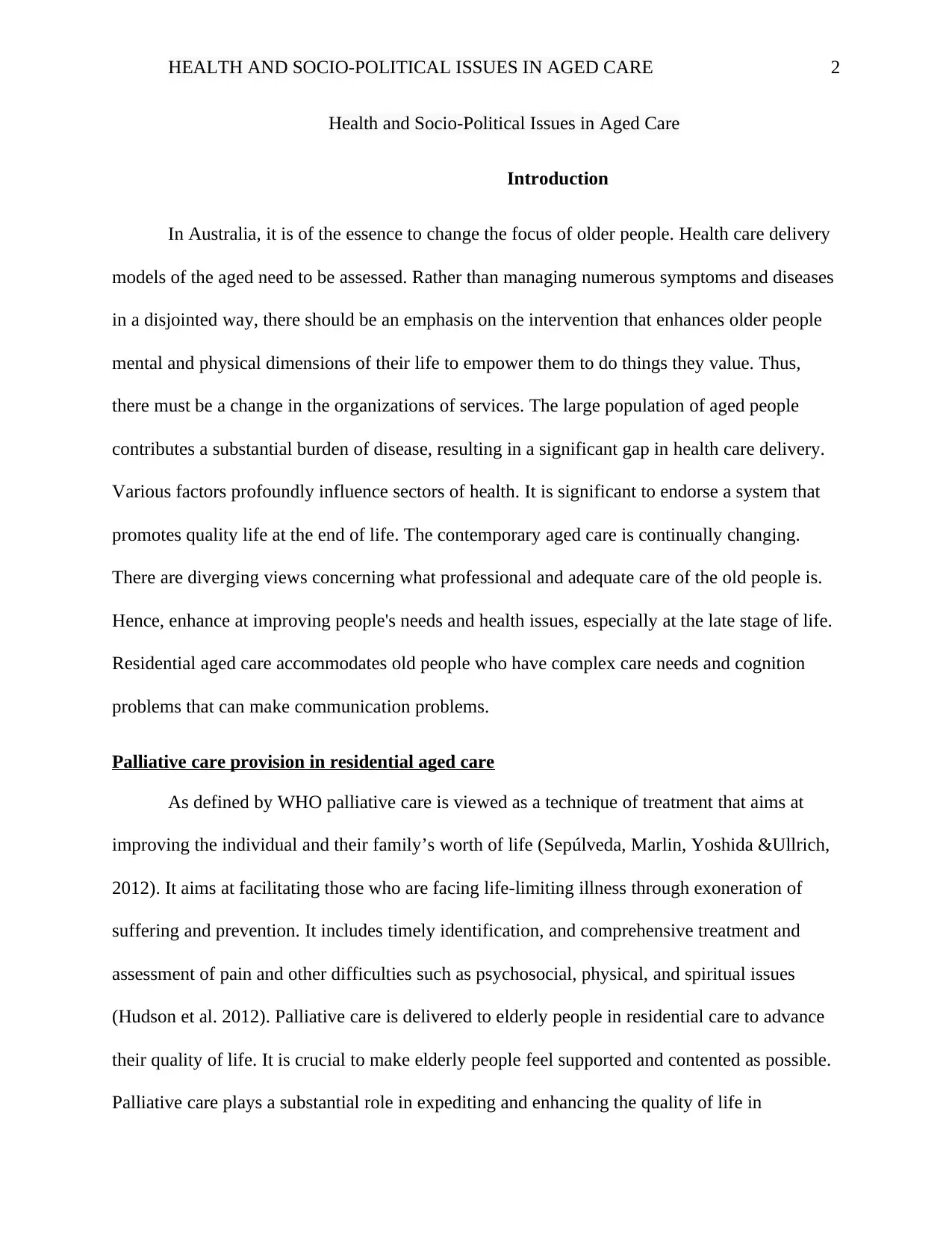
HEALTH AND SOCIO-POLITICAL ISSUES IN AGED CARE 2
Health and Socio-Political Issues in Aged Care
Introduction
In Australia, it is of the essence to change the focus of older people. Health care delivery
models of the aged need to be assessed. Rather than managing numerous symptoms and diseases
in a disjointed way, there should be an emphasis on the intervention that enhances older people
mental and physical dimensions of their life to empower them to do things they value. Thus,
there must be a change in the organizations of services. The large population of aged people
contributes a substantial burden of disease, resulting in a significant gap in health care delivery.
Various factors profoundly influence sectors of health. It is significant to endorse a system that
promotes quality life at the end of life. The contemporary aged care is continually changing.
There are diverging views concerning what professional and adequate care of the old people is.
Hence, enhance at improving people's needs and health issues, especially at the late stage of life.
Residential aged care accommodates old people who have complex care needs and cognition
problems that can make communication problems.
Palliative care provision in residential aged care
As defined by WHO palliative care is viewed as a technique of treatment that aims at
improving the individual and their family’s worth of life (Sepúlveda, Marlin, Yoshida &Ullrich,
2012). It aims at facilitating those who are facing life-limiting illness through exoneration of
suffering and prevention. It includes timely identification, and comprehensive treatment and
assessment of pain and other difficulties such as psychosocial, physical, and spiritual issues
(Hudson et al. 2012). Palliative care is delivered to elderly people in residential care to advance
their quality of life. It is crucial to make elderly people feel supported and contented as possible.
Palliative care plays a substantial role in expediting and enhancing the quality of life in
Health and Socio-Political Issues in Aged Care
Introduction
In Australia, it is of the essence to change the focus of older people. Health care delivery
models of the aged need to be assessed. Rather than managing numerous symptoms and diseases
in a disjointed way, there should be an emphasis on the intervention that enhances older people
mental and physical dimensions of their life to empower them to do things they value. Thus,
there must be a change in the organizations of services. The large population of aged people
contributes a substantial burden of disease, resulting in a significant gap in health care delivery.
Various factors profoundly influence sectors of health. It is significant to endorse a system that
promotes quality life at the end of life. The contemporary aged care is continually changing.
There are diverging views concerning what professional and adequate care of the old people is.
Hence, enhance at improving people's needs and health issues, especially at the late stage of life.
Residential aged care accommodates old people who have complex care needs and cognition
problems that can make communication problems.
Palliative care provision in residential aged care
As defined by WHO palliative care is viewed as a technique of treatment that aims at
improving the individual and their family’s worth of life (Sepúlveda, Marlin, Yoshida &Ullrich,
2012). It aims at facilitating those who are facing life-limiting illness through exoneration of
suffering and prevention. It includes timely identification, and comprehensive treatment and
assessment of pain and other difficulties such as psychosocial, physical, and spiritual issues
(Hudson et al. 2012). Palliative care is delivered to elderly people in residential care to advance
their quality of life. It is crucial to make elderly people feel supported and contented as possible.
Palliative care plays a substantial role in expediting and enhancing the quality of life in
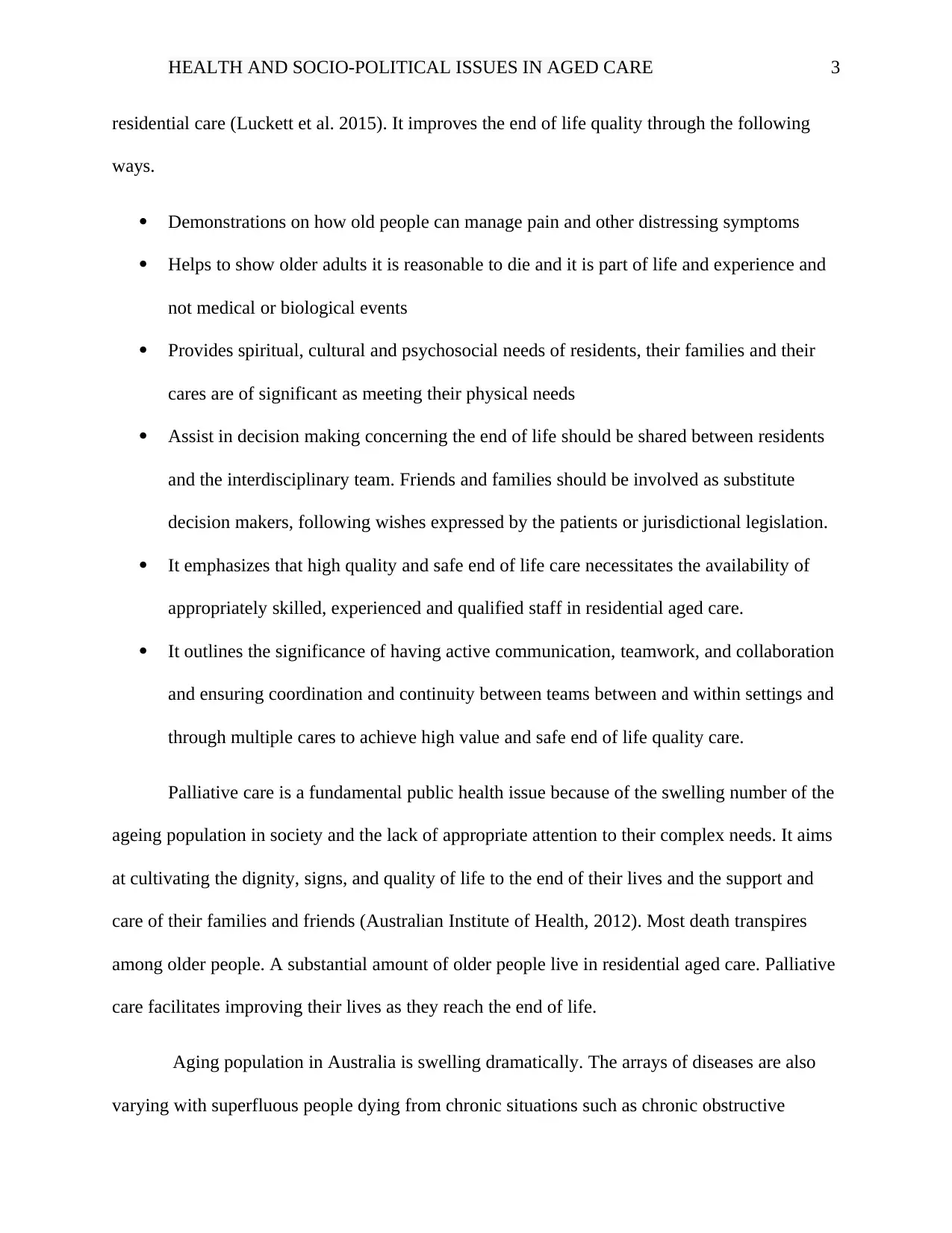
HEALTH AND SOCIO-POLITICAL ISSUES IN AGED CARE 3
residential care (Luckett et al. 2015). It improves the end of life quality through the following
ways.
Demonstrations on how old people can manage pain and other distressing symptoms
Helps to show older adults it is reasonable to die and it is part of life and experience and
not medical or biological events
Provides spiritual, cultural and psychosocial needs of residents, their families and their
cares are of significant as meeting their physical needs
Assist in decision making concerning the end of life should be shared between residents
and the interdisciplinary team. Friends and families should be involved as substitute
decision makers, following wishes expressed by the patients or jurisdictional legislation.
It emphasizes that high quality and safe end of life care necessitates the availability of
appropriately skilled, experienced and qualified staff in residential aged care.
It outlines the significance of having active communication, teamwork, and collaboration
and ensuring coordination and continuity between teams between and within settings and
through multiple cares to achieve high value and safe end of life quality care.
Palliative care is a fundamental public health issue because of the swelling number of the
ageing population in society and the lack of appropriate attention to their complex needs. It aims
at cultivating the dignity, signs, and quality of life to the end of their lives and the support and
care of their families and friends (Australian Institute of Health, 2012). Most death transpires
among older people. A substantial amount of older people live in residential aged care. Palliative
care facilitates improving their lives as they reach the end of life.
Aging population in Australia is swelling dramatically. The arrays of diseases are also
varying with superfluous people dying from chronic situations such as chronic obstructive
residential care (Luckett et al. 2015). It improves the end of life quality through the following
ways.
Demonstrations on how old people can manage pain and other distressing symptoms
Helps to show older adults it is reasonable to die and it is part of life and experience and
not medical or biological events
Provides spiritual, cultural and psychosocial needs of residents, their families and their
cares are of significant as meeting their physical needs
Assist in decision making concerning the end of life should be shared between residents
and the interdisciplinary team. Friends and families should be involved as substitute
decision makers, following wishes expressed by the patients or jurisdictional legislation.
It emphasizes that high quality and safe end of life care necessitates the availability of
appropriately skilled, experienced and qualified staff in residential aged care.
It outlines the significance of having active communication, teamwork, and collaboration
and ensuring coordination and continuity between teams between and within settings and
through multiple cares to achieve high value and safe end of life quality care.
Palliative care is a fundamental public health issue because of the swelling number of the
ageing population in society and the lack of appropriate attention to their complex needs. It aims
at cultivating the dignity, signs, and quality of life to the end of their lives and the support and
care of their families and friends (Australian Institute of Health, 2012). Most death transpires
among older people. A substantial amount of older people live in residential aged care. Palliative
care facilitates improving their lives as they reach the end of life.
Aging population in Australia is swelling dramatically. The arrays of diseases are also
varying with superfluous people dying from chronic situations such as chronic obstructive
⊘ This is a preview!⊘
Do you want full access?
Subscribe today to unlock all pages.

Trusted by 1+ million students worldwide
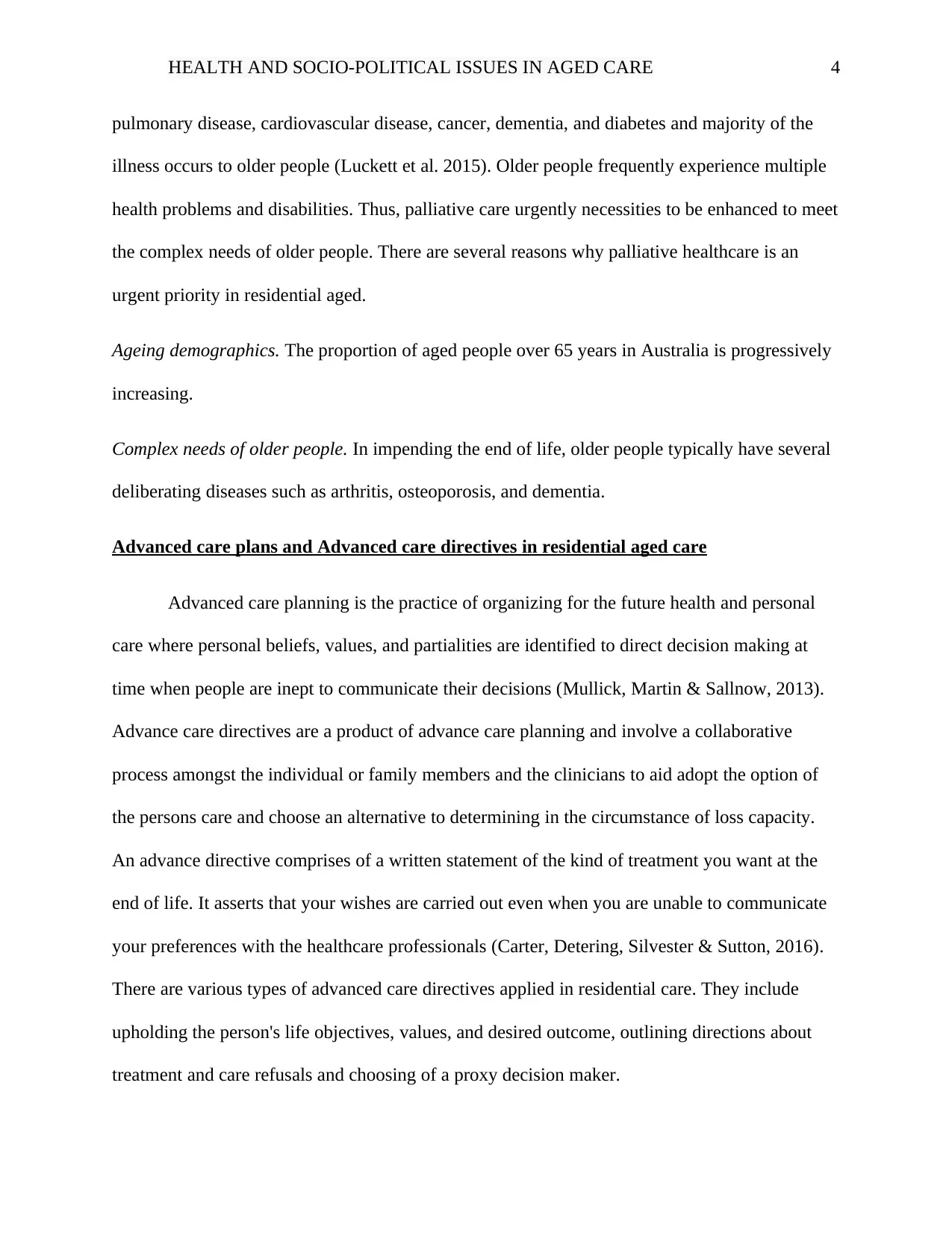
HEALTH AND SOCIO-POLITICAL ISSUES IN AGED CARE 4
pulmonary disease, cardiovascular disease, cancer, dementia, and diabetes and majority of the
illness occurs to older people (Luckett et al. 2015). Older people frequently experience multiple
health problems and disabilities. Thus, palliative care urgently necessities to be enhanced to meet
the complex needs of older people. There are several reasons why palliative healthcare is an
urgent priority in residential aged.
Ageing demographics. The proportion of aged people over 65 years in Australia is progressively
increasing.
Complex needs of older people. In impending the end of life, older people typically have several
deliberating diseases such as arthritis, osteoporosis, and dementia.
Advanced care plans and Advanced care directives in residential aged care
Advanced care planning is the practice of organizing for the future health and personal
care where personal beliefs, values, and partialities are identified to direct decision making at
time when people are inept to communicate their decisions (Mullick, Martin & Sallnow, 2013).
Advance care directives are a product of advance care planning and involve a collaborative
process amongst the individual or family members and the clinicians to aid adopt the option of
the persons care and choose an alternative to determining in the circumstance of loss capacity.
An advance directive comprises of a written statement of the kind of treatment you want at the
end of life. It asserts that your wishes are carried out even when you are unable to communicate
your preferences with the healthcare professionals (Carter, Detering, Silvester & Sutton, 2016).
There are various types of advanced care directives applied in residential care. They include
upholding the person's life objectives, values, and desired outcome, outlining directions about
treatment and care refusals and choosing of a proxy decision maker.
pulmonary disease, cardiovascular disease, cancer, dementia, and diabetes and majority of the
illness occurs to older people (Luckett et al. 2015). Older people frequently experience multiple
health problems and disabilities. Thus, palliative care urgently necessities to be enhanced to meet
the complex needs of older people. There are several reasons why palliative healthcare is an
urgent priority in residential aged.
Ageing demographics. The proportion of aged people over 65 years in Australia is progressively
increasing.
Complex needs of older people. In impending the end of life, older people typically have several
deliberating diseases such as arthritis, osteoporosis, and dementia.
Advanced care plans and Advanced care directives in residential aged care
Advanced care planning is the practice of organizing for the future health and personal
care where personal beliefs, values, and partialities are identified to direct decision making at
time when people are inept to communicate their decisions (Mullick, Martin & Sallnow, 2013).
Advance care directives are a product of advance care planning and involve a collaborative
process amongst the individual or family members and the clinicians to aid adopt the option of
the persons care and choose an alternative to determining in the circumstance of loss capacity.
An advance directive comprises of a written statement of the kind of treatment you want at the
end of life. It asserts that your wishes are carried out even when you are unable to communicate
your preferences with the healthcare professionals (Carter, Detering, Silvester & Sutton, 2016).
There are various types of advanced care directives applied in residential care. They include
upholding the person's life objectives, values, and desired outcome, outlining directions about
treatment and care refusals and choosing of a proxy decision maker.
Paraphrase This Document
Need a fresh take? Get an instant paraphrase of this document with our AI Paraphraser
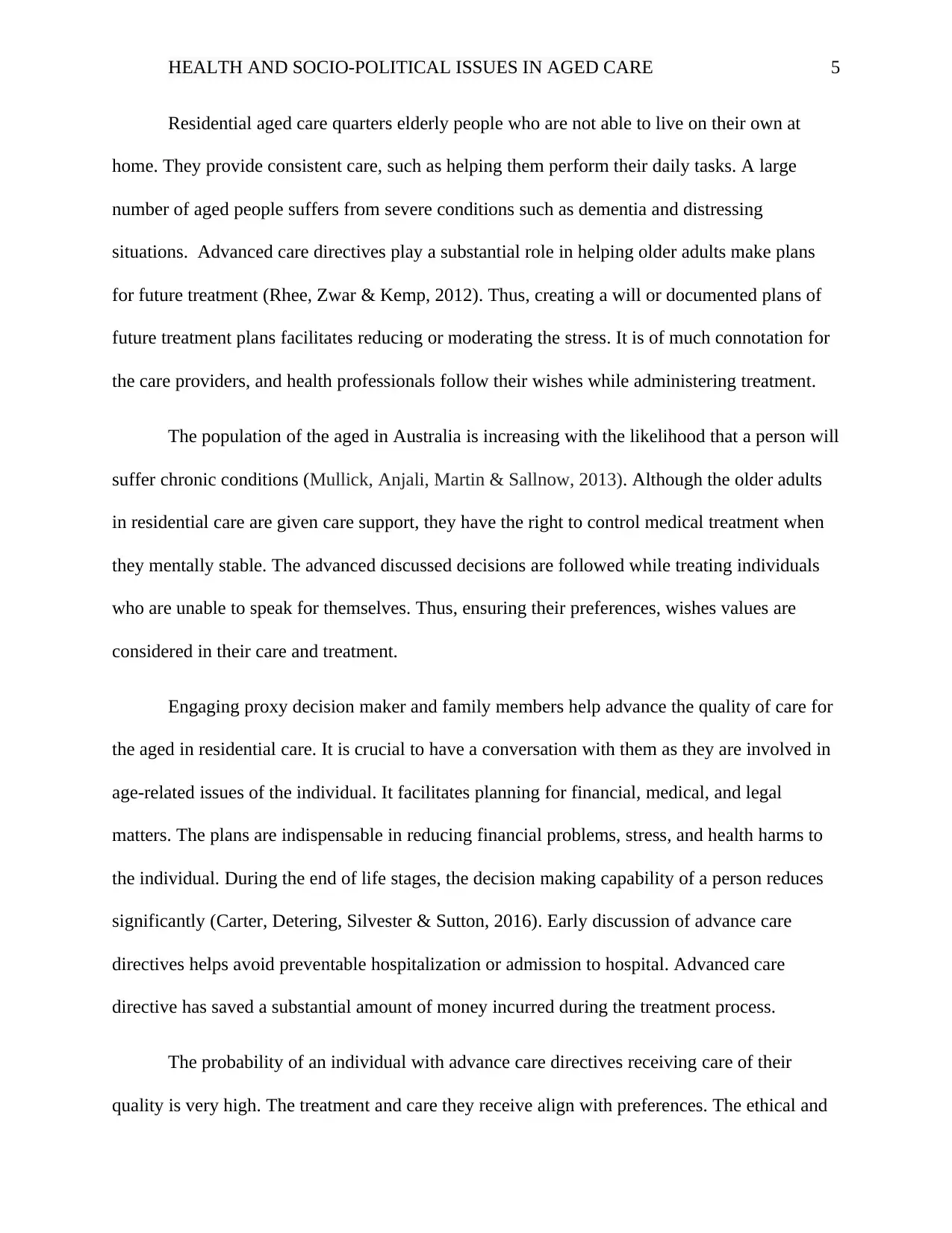
HEALTH AND SOCIO-POLITICAL ISSUES IN AGED CARE 5
Residential aged care quarters elderly people who are not able to live on their own at
home. They provide consistent care, such as helping them perform their daily tasks. A large
number of aged people suffers from severe conditions such as dementia and distressing
situations. Advanced care directives play a substantial role in helping older adults make plans
for future treatment (Rhee, Zwar & Kemp, 2012). Thus, creating a will or documented plans of
future treatment plans facilitates reducing or moderating the stress. It is of much connotation for
the care providers, and health professionals follow their wishes while administering treatment.
The population of the aged in Australia is increasing with the likelihood that a person will
suffer chronic conditions (Mullick, Anjali, Martin & Sallnow, 2013). Although the older adults
in residential care are given care support, they have the right to control medical treatment when
they mentally stable. The advanced discussed decisions are followed while treating individuals
who are unable to speak for themselves. Thus, ensuring their preferences, wishes values are
considered in their care and treatment.
Engaging proxy decision maker and family members help advance the quality of care for
the aged in residential care. It is crucial to have a conversation with them as they are involved in
age-related issues of the individual. It facilitates planning for financial, medical, and legal
matters. The plans are indispensable in reducing financial problems, stress, and health harms to
the individual. During the end of life stages, the decision making capability of a person reduces
significantly (Carter, Detering, Silvester & Sutton, 2016). Early discussion of advance care
directives helps avoid preventable hospitalization or admission to hospital. Advanced care
directive has saved a substantial amount of money incurred during the treatment process.
The probability of an individual with advance care directives receiving care of their
quality is very high. The treatment and care they receive align with preferences. The ethical and
Residential aged care quarters elderly people who are not able to live on their own at
home. They provide consistent care, such as helping them perform their daily tasks. A large
number of aged people suffers from severe conditions such as dementia and distressing
situations. Advanced care directives play a substantial role in helping older adults make plans
for future treatment (Rhee, Zwar & Kemp, 2012). Thus, creating a will or documented plans of
future treatment plans facilitates reducing or moderating the stress. It is of much connotation for
the care providers, and health professionals follow their wishes while administering treatment.
The population of the aged in Australia is increasing with the likelihood that a person will
suffer chronic conditions (Mullick, Anjali, Martin & Sallnow, 2013). Although the older adults
in residential care are given care support, they have the right to control medical treatment when
they mentally stable. The advanced discussed decisions are followed while treating individuals
who are unable to speak for themselves. Thus, ensuring their preferences, wishes values are
considered in their care and treatment.
Engaging proxy decision maker and family members help advance the quality of care for
the aged in residential care. It is crucial to have a conversation with them as they are involved in
age-related issues of the individual. It facilitates planning for financial, medical, and legal
matters. The plans are indispensable in reducing financial problems, stress, and health harms to
the individual. During the end of life stages, the decision making capability of a person reduces
significantly (Carter, Detering, Silvester & Sutton, 2016). Early discussion of advance care
directives helps avoid preventable hospitalization or admission to hospital. Advanced care
directive has saved a substantial amount of money incurred during the treatment process.
The probability of an individual with advance care directives receiving care of their
quality is very high. The treatment and care they receive align with preferences. The ethical and
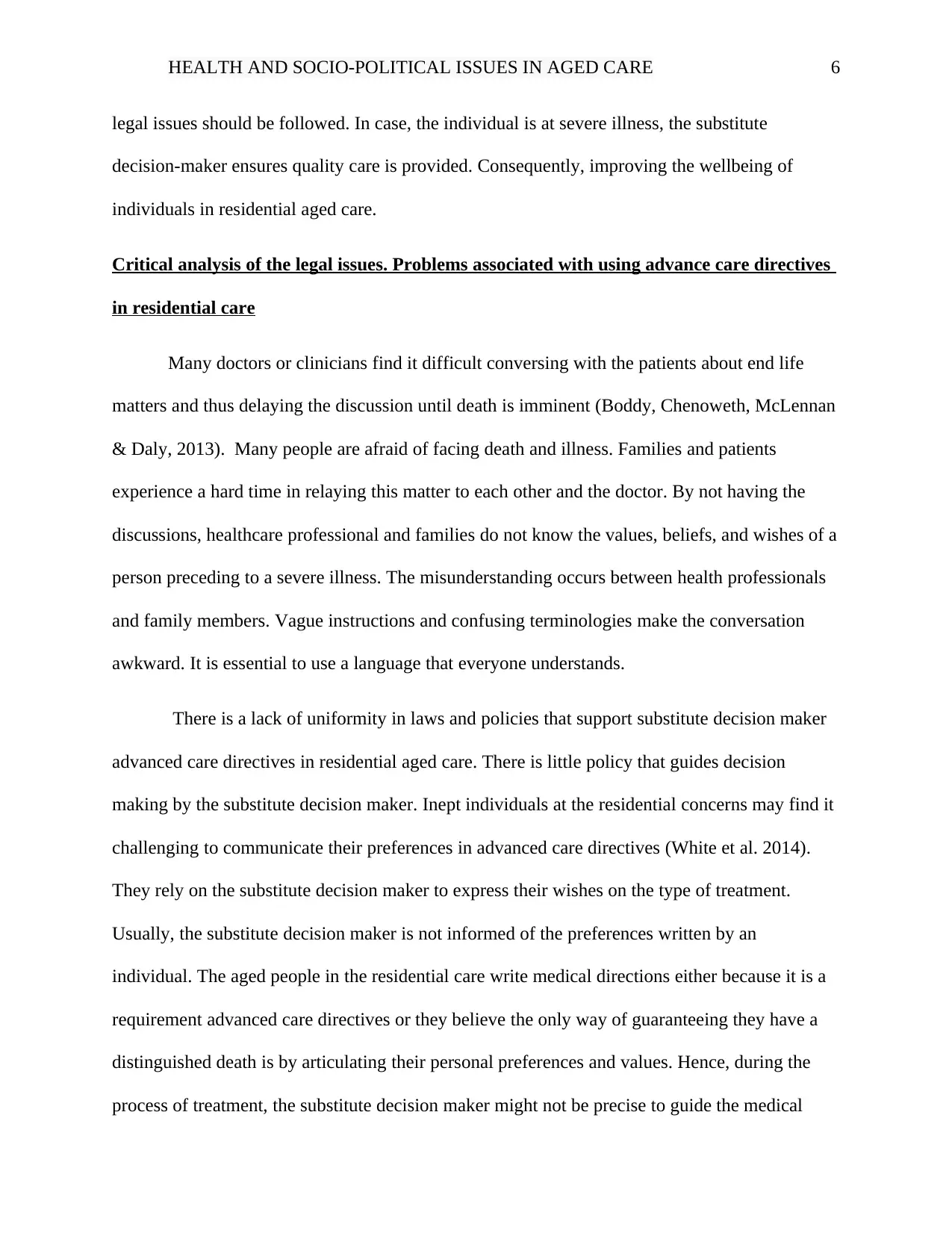
HEALTH AND SOCIO-POLITICAL ISSUES IN AGED CARE 6
legal issues should be followed. In case, the individual is at severe illness, the substitute
decision-maker ensures quality care is provided. Consequently, improving the wellbeing of
individuals in residential aged care.
Critical analysis of the legal issues. Problems associated with using advance care directives
in residential care
Many doctors or clinicians find it difficult conversing with the patients about end life
matters and thus delaying the discussion until death is imminent (Boddy, Chenoweth, McLennan
& Daly, 2013). Many people are afraid of facing death and illness. Families and patients
experience a hard time in relaying this matter to each other and the doctor. By not having the
discussions, healthcare professional and families do not know the values, beliefs, and wishes of a
person preceding to a severe illness. The misunderstanding occurs between health professionals
and family members. Vague instructions and confusing terminologies make the conversation
awkward. It is essential to use a language that everyone understands.
There is a lack of uniformity in laws and policies that support substitute decision maker
advanced care directives in residential aged care. There is little policy that guides decision
making by the substitute decision maker. Inept individuals at the residential concerns may find it
challenging to communicate their preferences in advanced care directives (White et al. 2014).
They rely on the substitute decision maker to express their wishes on the type of treatment.
Usually, the substitute decision maker is not informed of the preferences written by an
individual. The aged people in the residential care write medical directions either because it is a
requirement advanced care directives or they believe the only way of guaranteeing they have a
distinguished death is by articulating their personal preferences and values. Hence, during the
process of treatment, the substitute decision maker might not be precise to guide the medical
legal issues should be followed. In case, the individual is at severe illness, the substitute
decision-maker ensures quality care is provided. Consequently, improving the wellbeing of
individuals in residential aged care.
Critical analysis of the legal issues. Problems associated with using advance care directives
in residential care
Many doctors or clinicians find it difficult conversing with the patients about end life
matters and thus delaying the discussion until death is imminent (Boddy, Chenoweth, McLennan
& Daly, 2013). Many people are afraid of facing death and illness. Families and patients
experience a hard time in relaying this matter to each other and the doctor. By not having the
discussions, healthcare professional and families do not know the values, beliefs, and wishes of a
person preceding to a severe illness. The misunderstanding occurs between health professionals
and family members. Vague instructions and confusing terminologies make the conversation
awkward. It is essential to use a language that everyone understands.
There is a lack of uniformity in laws and policies that support substitute decision maker
advanced care directives in residential aged care. There is little policy that guides decision
making by the substitute decision maker. Inept individuals at the residential concerns may find it
challenging to communicate their preferences in advanced care directives (White et al. 2014).
They rely on the substitute decision maker to express their wishes on the type of treatment.
Usually, the substitute decision maker is not informed of the preferences written by an
individual. The aged people in the residential care write medical directions either because it is a
requirement advanced care directives or they believe the only way of guaranteeing they have a
distinguished death is by articulating their personal preferences and values. Hence, during the
process of treatment, the substitute decision maker might not be precise to guide the medical
⊘ This is a preview!⊘
Do you want full access?
Subscribe today to unlock all pages.

Trusted by 1+ million students worldwide
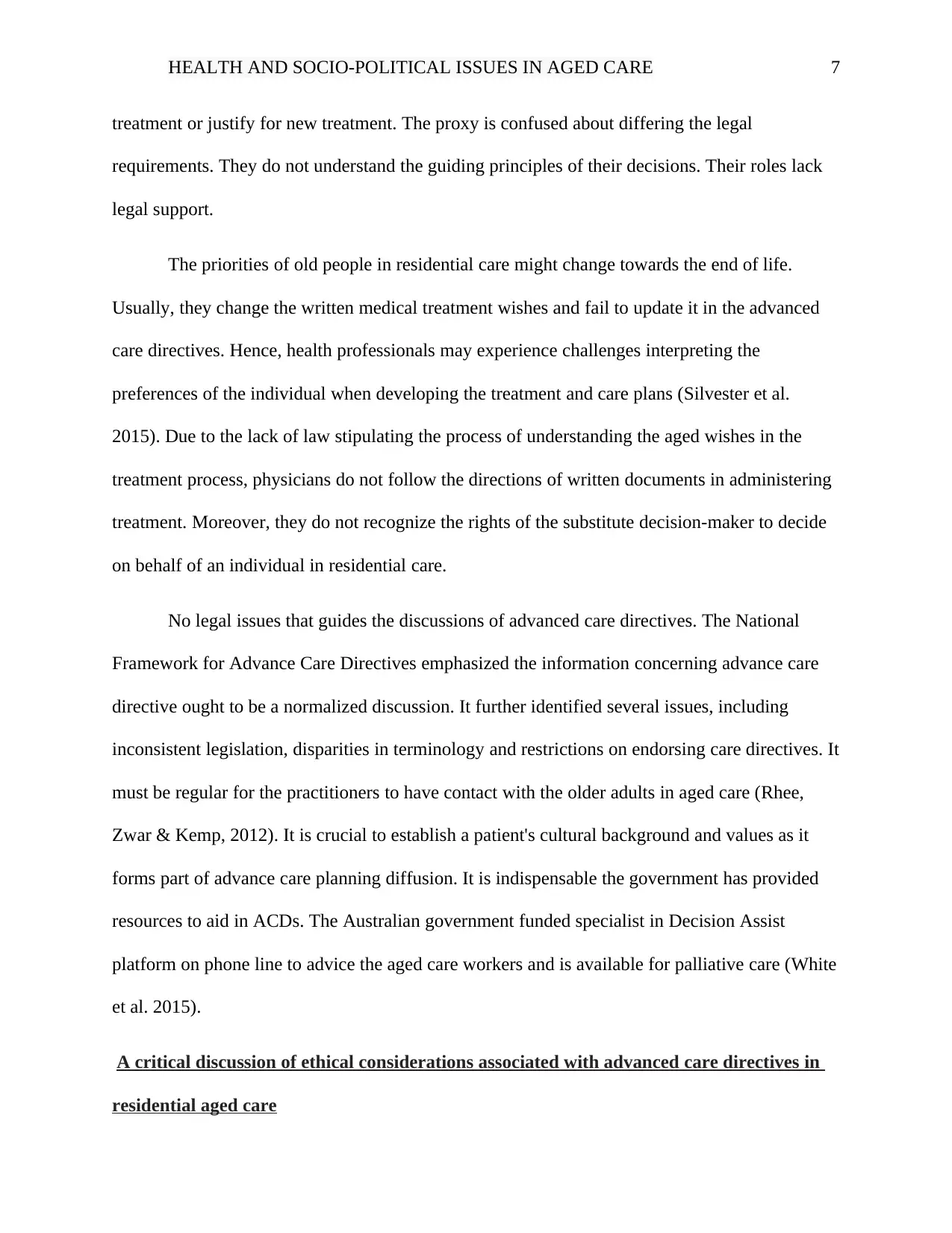
HEALTH AND SOCIO-POLITICAL ISSUES IN AGED CARE 7
treatment or justify for new treatment. The proxy is confused about differing the legal
requirements. They do not understand the guiding principles of their decisions. Their roles lack
legal support.
The priorities of old people in residential care might change towards the end of life.
Usually, they change the written medical treatment wishes and fail to update it in the advanced
care directives. Hence, health professionals may experience challenges interpreting the
preferences of the individual when developing the treatment and care plans (Silvester et al.
2015). Due to the lack of law stipulating the process of understanding the aged wishes in the
treatment process, physicians do not follow the directions of written documents in administering
treatment. Moreover, they do not recognize the rights of the substitute decision-maker to decide
on behalf of an individual in residential care.
No legal issues that guides the discussions of advanced care directives. The National
Framework for Advance Care Directives emphasized the information concerning advance care
directive ought to be a normalized discussion. It further identified several issues, including
inconsistent legislation, disparities in terminology and restrictions on endorsing care directives. It
must be regular for the practitioners to have contact with the older adults in aged care (Rhee,
Zwar & Kemp, 2012). It is crucial to establish a patient's cultural background and values as it
forms part of advance care planning diffusion. It is indispensable the government has provided
resources to aid in ACDs. The Australian government funded specialist in Decision Assist
platform on phone line to advice the aged care workers and is available for palliative care (White
et al. 2015).
A critical discussion of ethical considerations associated with advanced care directives in
residential aged care
treatment or justify for new treatment. The proxy is confused about differing the legal
requirements. They do not understand the guiding principles of their decisions. Their roles lack
legal support.
The priorities of old people in residential care might change towards the end of life.
Usually, they change the written medical treatment wishes and fail to update it in the advanced
care directives. Hence, health professionals may experience challenges interpreting the
preferences of the individual when developing the treatment and care plans (Silvester et al.
2015). Due to the lack of law stipulating the process of understanding the aged wishes in the
treatment process, physicians do not follow the directions of written documents in administering
treatment. Moreover, they do not recognize the rights of the substitute decision-maker to decide
on behalf of an individual in residential care.
No legal issues that guides the discussions of advanced care directives. The National
Framework for Advance Care Directives emphasized the information concerning advance care
directive ought to be a normalized discussion. It further identified several issues, including
inconsistent legislation, disparities in terminology and restrictions on endorsing care directives. It
must be regular for the practitioners to have contact with the older adults in aged care (Rhee,
Zwar & Kemp, 2012). It is crucial to establish a patient's cultural background and values as it
forms part of advance care planning diffusion. It is indispensable the government has provided
resources to aid in ACDs. The Australian government funded specialist in Decision Assist
platform on phone line to advice the aged care workers and is available for palliative care (White
et al. 2015).
A critical discussion of ethical considerations associated with advanced care directives in
residential aged care
Paraphrase This Document
Need a fresh take? Get an instant paraphrase of this document with our AI Paraphraser
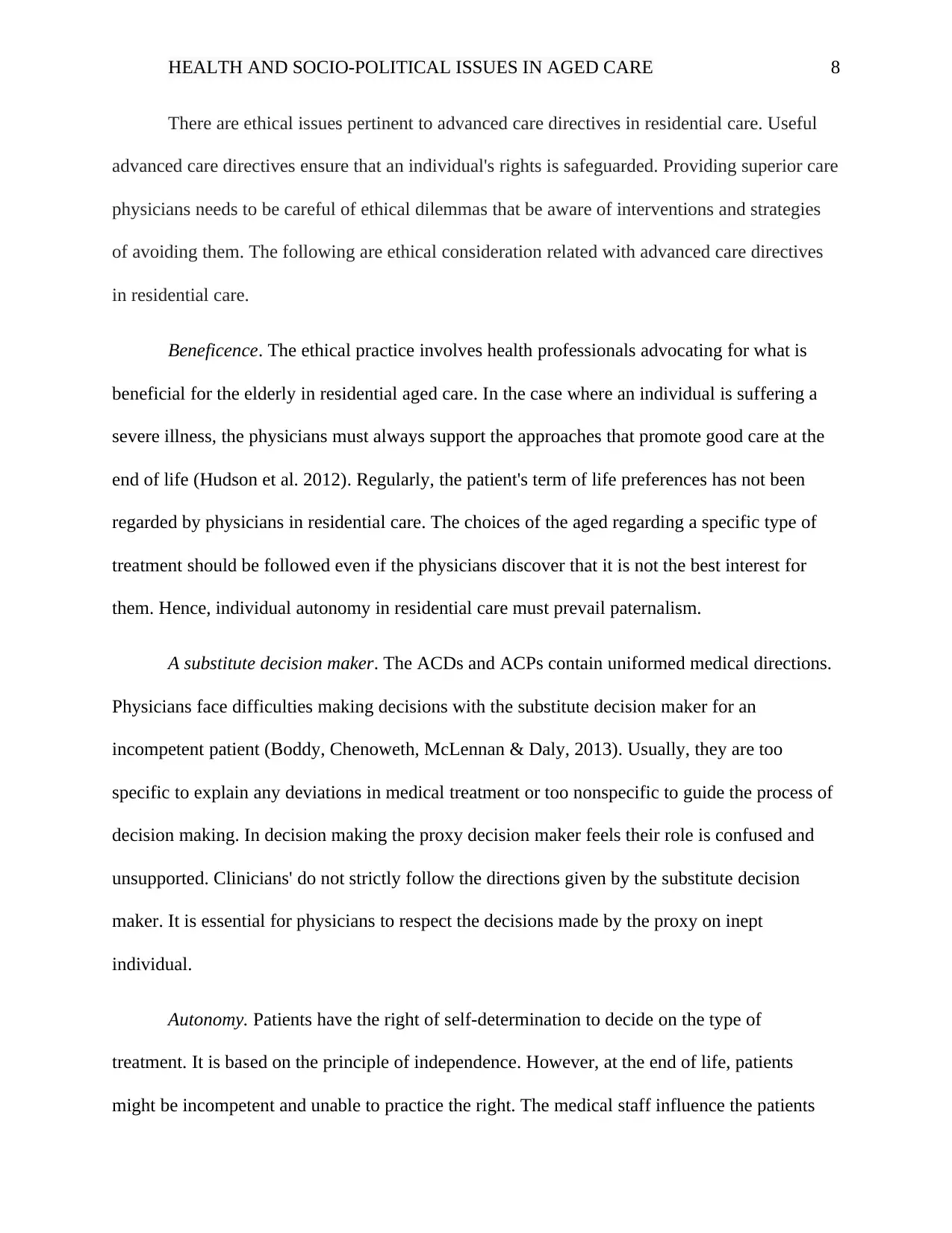
HEALTH AND SOCIO-POLITICAL ISSUES IN AGED CARE 8
There are ethical issues pertinent to advanced care directives in residential care. Useful
advanced care directives ensure that an individual's rights is safeguarded. Providing superior care
physicians needs to be careful of ethical dilemmas that be aware of interventions and strategies
of avoiding them. The following are ethical consideration related with advanced care directives
in residential care.
Beneficence. The ethical practice involves health professionals advocating for what is
beneficial for the elderly in residential aged care. In the case where an individual is suffering a
severe illness, the physicians must always support the approaches that promote good care at the
end of life (Hudson et al. 2012). Regularly, the patient's term of life preferences has not been
regarded by physicians in residential care. The choices of the aged regarding a specific type of
treatment should be followed even if the physicians discover that it is not the best interest for
them. Hence, individual autonomy in residential care must prevail paternalism.
A substitute decision maker. The ACDs and ACPs contain uniformed medical directions.
Physicians face difficulties making decisions with the substitute decision maker for an
incompetent patient (Boddy, Chenoweth, McLennan & Daly, 2013). Usually, they are too
specific to explain any deviations in medical treatment or too nonspecific to guide the process of
decision making. In decision making the proxy decision maker feels their role is confused and
unsupported. Clinicians' do not strictly follow the directions given by the substitute decision
maker. It is essential for physicians to respect the decisions made by the proxy on inept
individual.
Autonomy. Patients have the right of self-determination to decide on the type of
treatment. It is based on the principle of independence. However, at the end of life, patients
might be incompetent and unable to practice the right. The medical staff influence the patients
There are ethical issues pertinent to advanced care directives in residential care. Useful
advanced care directives ensure that an individual's rights is safeguarded. Providing superior care
physicians needs to be careful of ethical dilemmas that be aware of interventions and strategies
of avoiding them. The following are ethical consideration related with advanced care directives
in residential care.
Beneficence. The ethical practice involves health professionals advocating for what is
beneficial for the elderly in residential aged care. In the case where an individual is suffering a
severe illness, the physicians must always support the approaches that promote good care at the
end of life (Hudson et al. 2012). Regularly, the patient's term of life preferences has not been
regarded by physicians in residential care. The choices of the aged regarding a specific type of
treatment should be followed even if the physicians discover that it is not the best interest for
them. Hence, individual autonomy in residential care must prevail paternalism.
A substitute decision maker. The ACDs and ACPs contain uniformed medical directions.
Physicians face difficulties making decisions with the substitute decision maker for an
incompetent patient (Boddy, Chenoweth, McLennan & Daly, 2013). Usually, they are too
specific to explain any deviations in medical treatment or too nonspecific to guide the process of
decision making. In decision making the proxy decision maker feels their role is confused and
unsupported. Clinicians' do not strictly follow the directions given by the substitute decision
maker. It is essential for physicians to respect the decisions made by the proxy on inept
individual.
Autonomy. Patients have the right of self-determination to decide on the type of
treatment. It is based on the principle of independence. However, at the end of life, patients
might be incompetent and unable to practice the right. The medical staff influence the patients
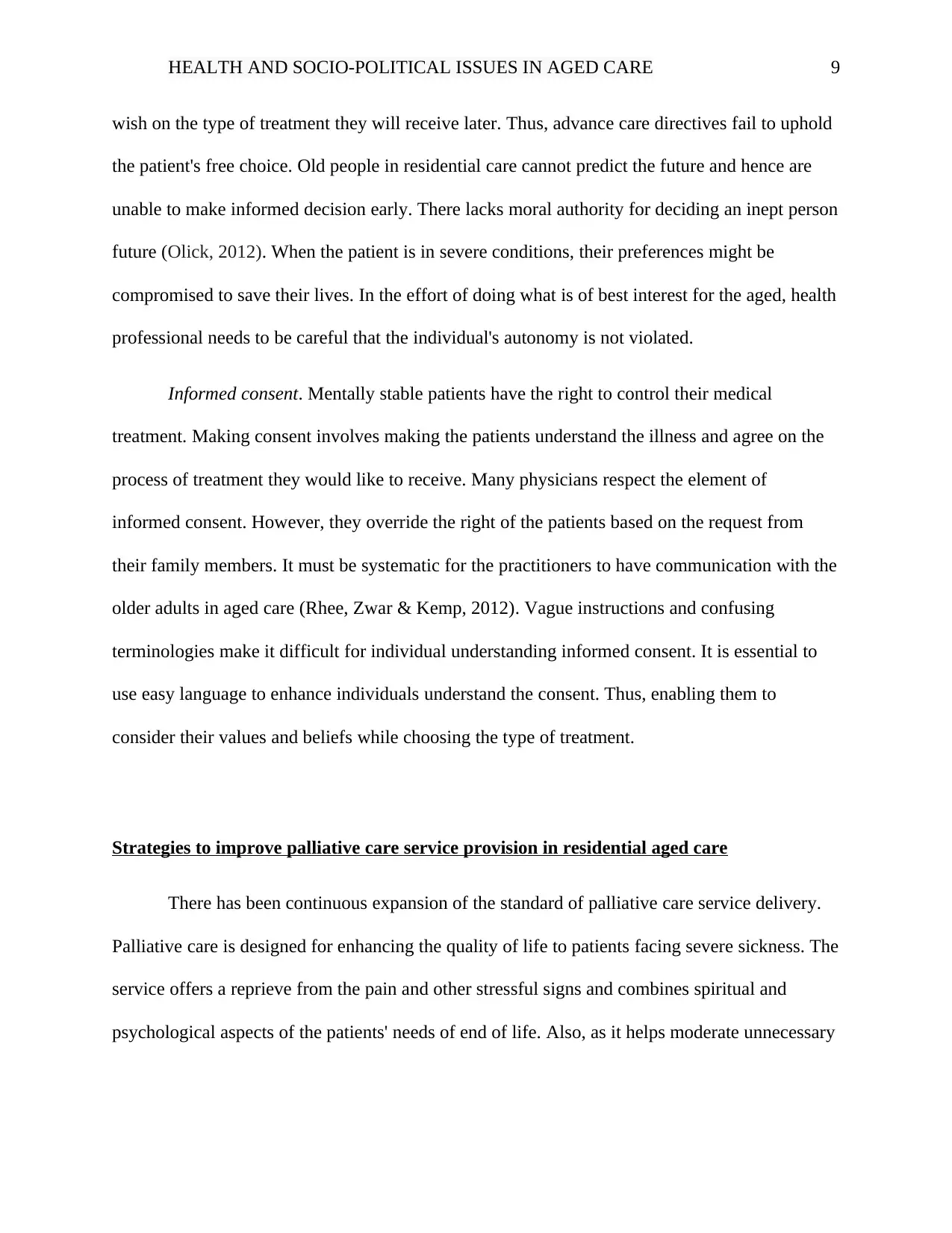
HEALTH AND SOCIO-POLITICAL ISSUES IN AGED CARE 9
wish on the type of treatment they will receive later. Thus, advance care directives fail to uphold
the patient's free choice. Old people in residential care cannot predict the future and hence are
unable to make informed decision early. There lacks moral authority for deciding an inept person
future (Olick, 2012). When the patient is in severe conditions, their preferences might be
compromised to save their lives. In the effort of doing what is of best interest for the aged, health
professional needs to be careful that the individual's autonomy is not violated.
Informed consent. Mentally stable patients have the right to control their medical
treatment. Making consent involves making the patients understand the illness and agree on the
process of treatment they would like to receive. Many physicians respect the element of
informed consent. However, they override the right of the patients based on the request from
their family members. It must be systematic for the practitioners to have communication with the
older adults in aged care (Rhee, Zwar & Kemp, 2012). Vague instructions and confusing
terminologies make it difficult for individual understanding informed consent. It is essential to
use easy language to enhance individuals understand the consent. Thus, enabling them to
consider their values and beliefs while choosing the type of treatment.
Strategies to improve palliative care service provision in residential aged care
There has been continuous expansion of the standard of palliative care service delivery.
Palliative care is designed for enhancing the quality of life to patients facing severe sickness. The
service offers a reprieve from the pain and other stressful signs and combines spiritual and
psychological aspects of the patients' needs of end of life. Also, as it helps moderate unnecessary
wish on the type of treatment they will receive later. Thus, advance care directives fail to uphold
the patient's free choice. Old people in residential care cannot predict the future and hence are
unable to make informed decision early. There lacks moral authority for deciding an inept person
future (Olick, 2012). When the patient is in severe conditions, their preferences might be
compromised to save their lives. In the effort of doing what is of best interest for the aged, health
professional needs to be careful that the individual's autonomy is not violated.
Informed consent. Mentally stable patients have the right to control their medical
treatment. Making consent involves making the patients understand the illness and agree on the
process of treatment they would like to receive. Many physicians respect the element of
informed consent. However, they override the right of the patients based on the request from
their family members. It must be systematic for the practitioners to have communication with the
older adults in aged care (Rhee, Zwar & Kemp, 2012). Vague instructions and confusing
terminologies make it difficult for individual understanding informed consent. It is essential to
use easy language to enhance individuals understand the consent. Thus, enabling them to
consider their values and beliefs while choosing the type of treatment.
Strategies to improve palliative care service provision in residential aged care
There has been continuous expansion of the standard of palliative care service delivery.
Palliative care is designed for enhancing the quality of life to patients facing severe sickness. The
service offers a reprieve from the pain and other stressful signs and combines spiritual and
psychological aspects of the patients' needs of end of life. Also, as it helps moderate unnecessary
⊘ This is a preview!⊘
Do you want full access?
Subscribe today to unlock all pages.

Trusted by 1+ million students worldwide
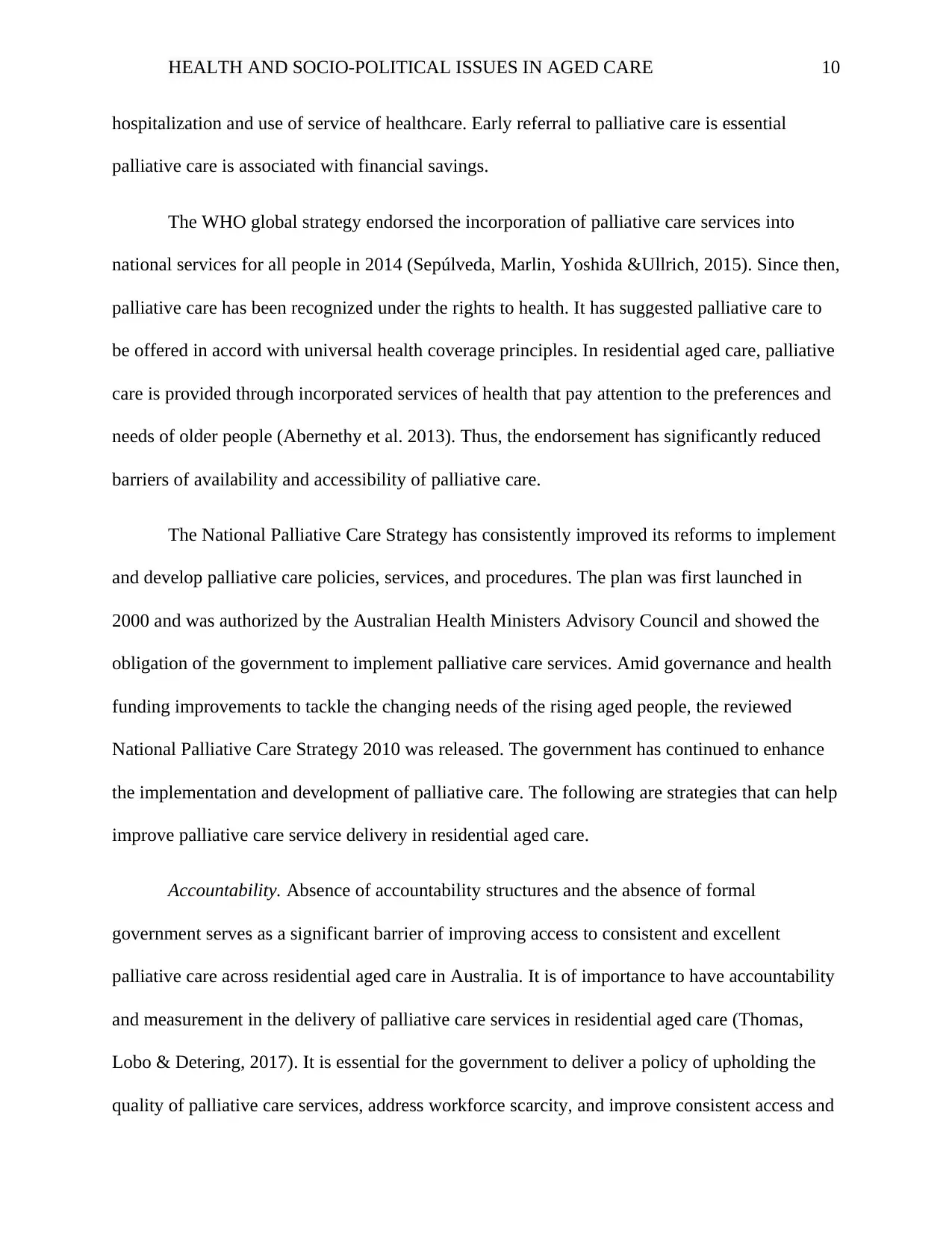
HEALTH AND SOCIO-POLITICAL ISSUES IN AGED CARE 10
hospitalization and use of service of healthcare. Early referral to palliative care is essential
palliative care is associated with financial savings.
The WHO global strategy endorsed the incorporation of palliative care services into
national services for all people in 2014 (Sepúlveda, Marlin, Yoshida &Ullrich, 2015). Since then,
palliative care has been recognized under the rights to health. It has suggested palliative care to
be offered in accord with universal health coverage principles. In residential aged care, palliative
care is provided through incorporated services of health that pay attention to the preferences and
needs of older people (Abernethy et al. 2013). Thus, the endorsement has significantly reduced
barriers of availability and accessibility of palliative care.
The National Palliative Care Strategy has consistently improved its reforms to implement
and develop palliative care policies, services, and procedures. The plan was first launched in
2000 and was authorized by the Australian Health Ministers Advisory Council and showed the
obligation of the government to implement palliative care services. Amid governance and health
funding improvements to tackle the changing needs of the rising aged people, the reviewed
National Palliative Care Strategy 2010 was released. The government has continued to enhance
the implementation and development of palliative care. The following are strategies that can help
improve palliative care service delivery in residential aged care.
Accountability. Absence of accountability structures and the absence of formal
government serves as a significant barrier of improving access to consistent and excellent
palliative care across residential aged care in Australia. It is of importance to have accountability
and measurement in the delivery of palliative care services in residential aged care (Thomas,
Lobo & Detering, 2017). It is essential for the government to deliver a policy of upholding the
quality of palliative care services, address workforce scarcity, and improve consistent access and
hospitalization and use of service of healthcare. Early referral to palliative care is essential
palliative care is associated with financial savings.
The WHO global strategy endorsed the incorporation of palliative care services into
national services for all people in 2014 (Sepúlveda, Marlin, Yoshida &Ullrich, 2015). Since then,
palliative care has been recognized under the rights to health. It has suggested palliative care to
be offered in accord with universal health coverage principles. In residential aged care, palliative
care is provided through incorporated services of health that pay attention to the preferences and
needs of older people (Abernethy et al. 2013). Thus, the endorsement has significantly reduced
barriers of availability and accessibility of palliative care.
The National Palliative Care Strategy has consistently improved its reforms to implement
and develop palliative care policies, services, and procedures. The plan was first launched in
2000 and was authorized by the Australian Health Ministers Advisory Council and showed the
obligation of the government to implement palliative care services. Amid governance and health
funding improvements to tackle the changing needs of the rising aged people, the reviewed
National Palliative Care Strategy 2010 was released. The government has continued to enhance
the implementation and development of palliative care. The following are strategies that can help
improve palliative care service delivery in residential aged care.
Accountability. Absence of accountability structures and the absence of formal
government serves as a significant barrier of improving access to consistent and excellent
palliative care across residential aged care in Australia. It is of importance to have accountability
and measurement in the delivery of palliative care services in residential aged care (Thomas,
Lobo & Detering, 2017). It is essential for the government to deliver a policy of upholding the
quality of palliative care services, address workforce scarcity, and improve consistent access and
Paraphrase This Document
Need a fresh take? Get an instant paraphrase of this document with our AI Paraphraser
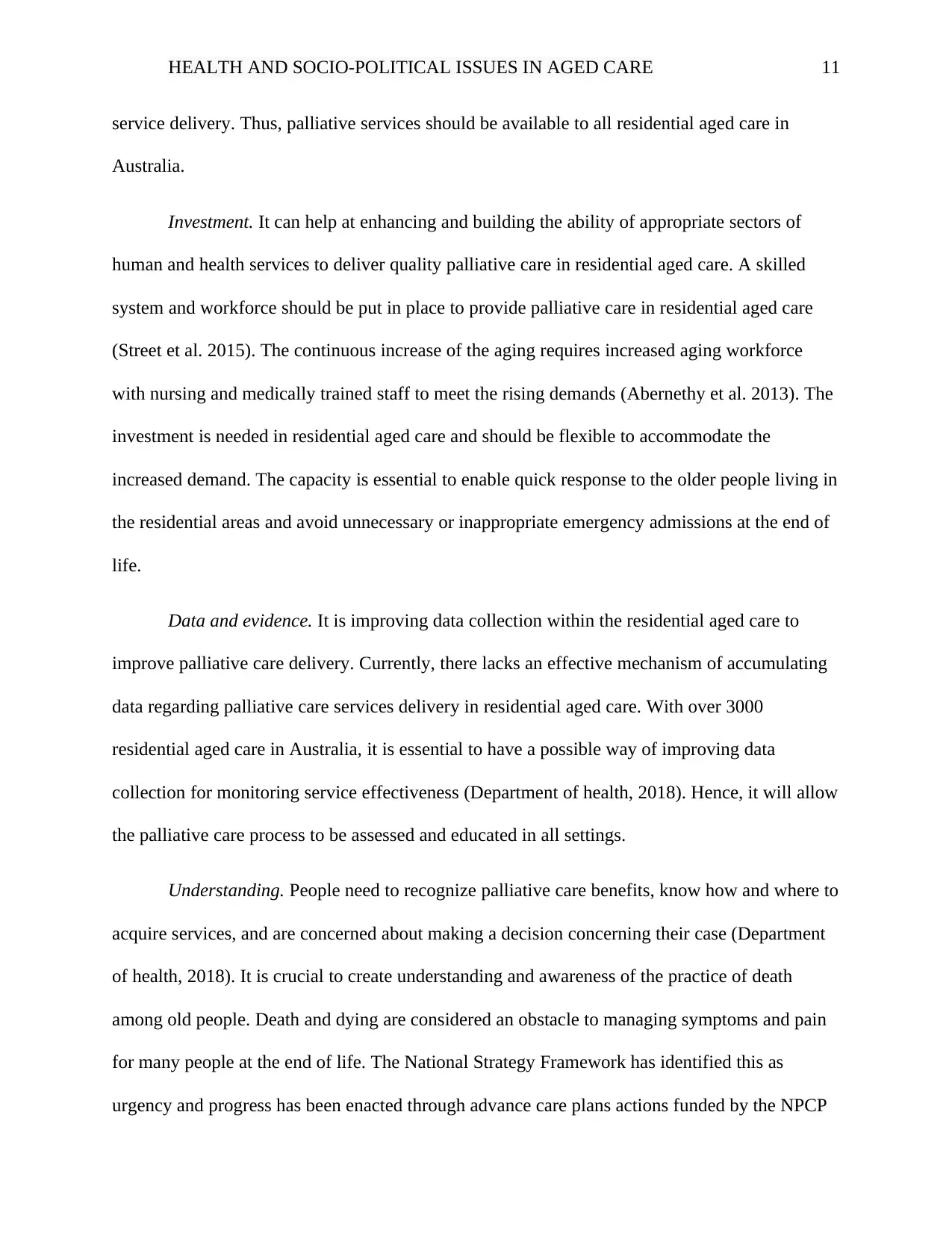
HEALTH AND SOCIO-POLITICAL ISSUES IN AGED CARE 11
service delivery. Thus, palliative services should be available to all residential aged care in
Australia.
Investment. It can help at enhancing and building the ability of appropriate sectors of
human and health services to deliver quality palliative care in residential aged care. A skilled
system and workforce should be put in place to provide palliative care in residential aged care
(Street et al. 2015). The continuous increase of the aging requires increased aging workforce
with nursing and medically trained staff to meet the rising demands (Abernethy et al. 2013). The
investment is needed in residential aged care and should be flexible to accommodate the
increased demand. The capacity is essential to enable quick response to the older people living in
the residential areas and avoid unnecessary or inappropriate emergency admissions at the end of
life.
Data and evidence. It is improving data collection within the residential aged care to
improve palliative care delivery. Currently, there lacks an effective mechanism of accumulating
data regarding palliative care services delivery in residential aged care. With over 3000
residential aged care in Australia, it is essential to have a possible way of improving data
collection for monitoring service effectiveness (Department of health, 2018). Hence, it will allow
the palliative care process to be assessed and educated in all settings.
Understanding. People need to recognize palliative care benefits, know how and where to
acquire services, and are concerned about making a decision concerning their case (Department
of health, 2018). It is crucial to create understanding and awareness of the practice of death
among old people. Death and dying are considered an obstacle to managing symptoms and pain
for many people at the end of life. The National Strategy Framework has identified this as
urgency and progress has been enacted through advance care plans actions funded by the NPCP
service delivery. Thus, palliative services should be available to all residential aged care in
Australia.
Investment. It can help at enhancing and building the ability of appropriate sectors of
human and health services to deliver quality palliative care in residential aged care. A skilled
system and workforce should be put in place to provide palliative care in residential aged care
(Street et al. 2015). The continuous increase of the aging requires increased aging workforce
with nursing and medically trained staff to meet the rising demands (Abernethy et al. 2013). The
investment is needed in residential aged care and should be flexible to accommodate the
increased demand. The capacity is essential to enable quick response to the older people living in
the residential areas and avoid unnecessary or inappropriate emergency admissions at the end of
life.
Data and evidence. It is improving data collection within the residential aged care to
improve palliative care delivery. Currently, there lacks an effective mechanism of accumulating
data regarding palliative care services delivery in residential aged care. With over 3000
residential aged care in Australia, it is essential to have a possible way of improving data
collection for monitoring service effectiveness (Department of health, 2018). Hence, it will allow
the palliative care process to be assessed and educated in all settings.
Understanding. People need to recognize palliative care benefits, know how and where to
acquire services, and are concerned about making a decision concerning their case (Department
of health, 2018). It is crucial to create understanding and awareness of the practice of death
among old people. Death and dying are considered an obstacle to managing symptoms and pain
for many people at the end of life. The National Strategy Framework has identified this as
urgency and progress has been enacted through advance care plans actions funded by the NPCP
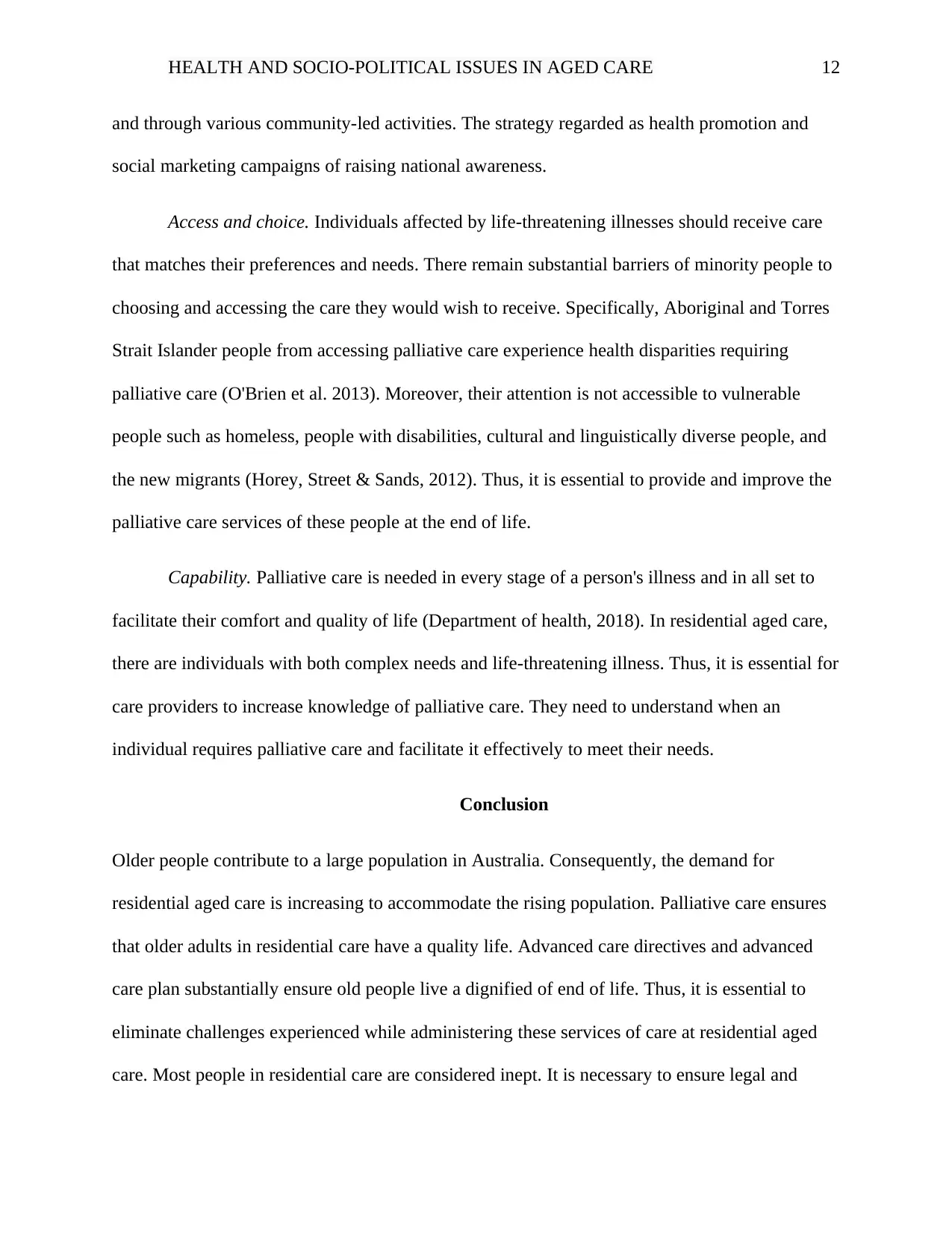
HEALTH AND SOCIO-POLITICAL ISSUES IN AGED CARE 12
and through various community-led activities. The strategy regarded as health promotion and
social marketing campaigns of raising national awareness.
Access and choice. Individuals affected by life-threatening illnesses should receive care
that matches their preferences and needs. There remain substantial barriers of minority people to
choosing and accessing the care they would wish to receive. Specifically, Aboriginal and Torres
Strait Islander people from accessing palliative care experience health disparities requiring
palliative care (O'Brien et al. 2013). Moreover, their attention is not accessible to vulnerable
people such as homeless, people with disabilities, cultural and linguistically diverse people, and
the new migrants (Horey, Street & Sands, 2012). Thus, it is essential to provide and improve the
palliative care services of these people at the end of life.
Capability. Palliative care is needed in every stage of a person's illness and in all set to
facilitate their comfort and quality of life (Department of health, 2018). In residential aged care,
there are individuals with both complex needs and life-threatening illness. Thus, it is essential for
care providers to increase knowledge of palliative care. They need to understand when an
individual requires palliative care and facilitate it effectively to meet their needs.
Conclusion
Older people contribute to a large population in Australia. Consequently, the demand for
residential aged care is increasing to accommodate the rising population. Palliative care ensures
that older adults in residential care have a quality life. Advanced care directives and advanced
care plan substantially ensure old people live a dignified of end of life. Thus, it is essential to
eliminate challenges experienced while administering these services of care at residential aged
care. Most people in residential care are considered inept. It is necessary to ensure legal and
and through various community-led activities. The strategy regarded as health promotion and
social marketing campaigns of raising national awareness.
Access and choice. Individuals affected by life-threatening illnesses should receive care
that matches their preferences and needs. There remain substantial barriers of minority people to
choosing and accessing the care they would wish to receive. Specifically, Aboriginal and Torres
Strait Islander people from accessing palliative care experience health disparities requiring
palliative care (O'Brien et al. 2013). Moreover, their attention is not accessible to vulnerable
people such as homeless, people with disabilities, cultural and linguistically diverse people, and
the new migrants (Horey, Street & Sands, 2012). Thus, it is essential to provide and improve the
palliative care services of these people at the end of life.
Capability. Palliative care is needed in every stage of a person's illness and in all set to
facilitate their comfort and quality of life (Department of health, 2018). In residential aged care,
there are individuals with both complex needs and life-threatening illness. Thus, it is essential for
care providers to increase knowledge of palliative care. They need to understand when an
individual requires palliative care and facilitate it effectively to meet their needs.
Conclusion
Older people contribute to a large population in Australia. Consequently, the demand for
residential aged care is increasing to accommodate the rising population. Palliative care ensures
that older adults in residential care have a quality life. Advanced care directives and advanced
care plan substantially ensure old people live a dignified of end of life. Thus, it is essential to
eliminate challenges experienced while administering these services of care at residential aged
care. Most people in residential care are considered inept. It is necessary to ensure legal and
⊘ This is a preview!⊘
Do you want full access?
Subscribe today to unlock all pages.

Trusted by 1+ million students worldwide
1 out of 16
Related Documents
Your All-in-One AI-Powered Toolkit for Academic Success.
+13062052269
info@desklib.com
Available 24*7 on WhatsApp / Email
![[object Object]](/_next/static/media/star-bottom.7253800d.svg)
Unlock your academic potential
Copyright © 2020–2026 A2Z Services. All Rights Reserved. Developed and managed by ZUCOL.





